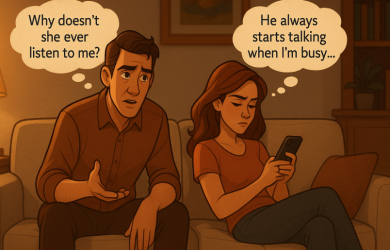Improving Communication With a Passive Aggressive Spouse

Key Takeaways
Marriage.com AI Quick Summary
Is your spouse passive-aggressive? Perhaps your teenager is? Much of what I will say here applies to spouses and teenagers.
Passive aggressive style of marriage communication
Do you find yourself feeling frustrated when your seemingly reasonable questions go unanswered and attempt to communicate are met with silence? Are you resentful of their ability to turn things around so that what was initially an issue surrounding something they did that you wanted to discuss with them has now become all about your anger?
If this sounds familiar, then it is quite possible you are married to someone who has a passive-aggressive style of marriage communication.
Another example would be in a situation in which they have wronged you.
A person who uses passive-aggressive communication style has the uncanny ability to somehow be the victim.
Engaging in stonewalling and flat out avoidance of you
A passive-aggressive spouse can shut down a discussion by refusing to discuss things further and then blame you when, out of frustration, you pursue a confrontation.
They may say things like: “this is how you always get, yelling, and being so aggressive! You never know when to stop-your questions.” Or “there’s nothing to talk about. You always do this. You are looking for problems.”
They might even engage in Stonewalling-refusing to talk with you and avoid your attempts to talk with them by resentful silence, and flat out avoidance of you. Your texts go unanswered for hours or perhaps unanswered, they minimally communicate, and may implicate you in communication with other family members, like your children.
Blaming you to be a control freak
They may agree to do something, not do it, and then when you confront them, they insist you are controlling.
So the bad news is that you have a Passive-Aggressive Spouse.
The good news is that there are ways you can improve your own communication style with them so that the passive-aggressive trap is avoided. It is essential that you increase your awareness of the dysfunctional pattern you are in with your spouse.
Passive-aggressiveness is based upon control.
By not communicating and by deflecting attention back to what you are doing, they get the upper hand and resist confrontation indirectly.
Refusing to go for therapy
The result for the non-passive aggressive spouse is that they feel frustrated, angry, and sometimes out of desperation, act verbally aggressive. The original issue is lost as the focus is now on your bad behavior.
And here’s the best part: they will often refuse to go for therapy. When they do agree, they do because they are sure the therapist will tell you that you are the one in the wrong. And actually, by the time you both do come to marriage counseling, you will most likely have made quite a few mistakes in your dealings with your passive-aggressive spouse.
Passive-aggressive communication style fosters hostility
For sure, in any relationship, both parties have to take responsibility for the issues in their relationship. But also, it is part of the passive aggressive communication cycle that their passive aggressiveness fosters disharmony, breaks in communication, and hostility from their partners.
So, what to do?
A spouse who uses passive-aggressive tactics is very difficult to reason with. And ultimately, we can’t control other people, we can only control ourselves.
The first step to improving your communication
So the first step to improving your communication with someone who is passive-aggressive is to learn how to respond and not react to their behavior. I know, it’s challenging!
But if you practice on reducing your reactivity when you are not in crisis or upset, you will be less reactive when there really is a problem.
Not being reactive will likely give you the upper hand.
When you find yourself faced with stony silence or avoidance from your spouse, take a moment to take a breath, and mentally review what your usual communication pattern with your spouse is.
Imagine yourself saying something to your spouse, imagine their response
Imagine the escalation, the increasing frustration, and finally, imagine yourself walking away aggravated, worn down, and unhappy.
Now ask yourself, should you go ahead with the usual pattern, or does it make sense to calm yourself, take your time thinking about an appropriate response, and take some space.
Sometimes, a passive aggressive spouse will feel the distance you have taken and will move towards you. It doesn’t always work, but it is a much better plan than the usual scenario of escalation, frustration, and distance taken by your spouse.
Take time to think through an appropriate response to your spouse
Make the response brief and communicate how you feel.
Let your spouse know that you feel that, as a couple, you are stuck in an unhelpful communication rut. Talk about what the two of you can do to change that.
Let your spouse know that you want to hear about their frustrations with you. It is quite possible that this will not help much, and it is also quite possible that your spouse will not agree to go for couples counseling.
It is important that you take care of yourself
If your spouse will not go to therapy with you, then I strongly recommend you go alone. I also recommend reading some of the good books written by therapists on coping with a passive aggressive spouse.
It is important that you take care of yourself, not give in to reactivity, and practice more effective coping strategies, hopefully with the support of a good therapist.
 Tips
Tips
Write your tip or submit a video tip
All tips are reviewed before the publishing.
Share this article on
Want to have a happier, healthier marriage?
If you feel disconnected or frustrated about the state of your marriage but want to avoid separation and/or divorce, the marriage.com course meant for married couples is an excellent resource to help you overcome the most challenging aspects of being married.
Related Articles
Recent Articles
Related Quizzes
Unlock Daily 30-Sec Tips for a Happier, Healthier Relationship
👉 Subscribe FREE on YouTube We'd love your feedback!
We'd love your feedback!
 Expert Q&A
Expert Q&A
Ask your question related to this topic & get the support you deserve from experts.



















 Thanks for your feedback!
Thanks for your feedback!